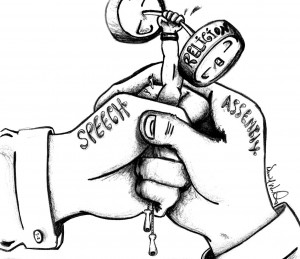
“Congress shall make no law respecting an establishment of religion, or prohibiting the free exercise thereof…”
— First Amendment to the Constitution
With Constitution Day coming up and recent demonstrations in apparent ignorance of this clause of the document, perhaps a reminder of it is necessary. Freedom of religion is listed in the Bill of Rights in the same breath as the freedoms of speech, press and assembly, yet over the past decade — the past few months in particular — the freedoms of speech and assembly have been used to undermine that of religion.
This clause, as with every other clause in the Bill of Rights, was written in specific reference to a human rights abuse that put the colonies at a disadvantage to England. At the time, to hold public office in England, one had to be a member of the Church of England. The king held over members of the Church of England all the power that the pope holds over Catholics, specifically the power to excommunicate members, or forcibly remove them from the church. The king used this power to prevent anyone he didn’t like from holding public office by revoking their eligibility.
This specific example shows what abuses can be enacted if the citizens of a nation are not free to practice their own beliefs. An extreme example of this was the Spanish Inquisition when dissenters from the Catholic Church were legally tortured to death.
The Soviet Union stated as an ideological goal that religion be abolished in favor of atheism and actively persecuted those who still practiced their beliefs both legally and illegally.
Even today, we have a list of countries that do not observe freedom of religion — an ominous who’s who of international “bad guys.” China allows only government-sanctioned organizations to practice religion and registers their houses of worship. Iran formally protects Zoroastrianism, Judaism, Christianity and Islam, but members of other religions are subject to denial of education, false arrests and even execution.
But, of course, none of this would happen in America. All that’s happened as of yet have been exercises of the freedoms of speech and assembly. No acts of violence have been endorsed.
It was said best by Heinrich Heine, a German-Jewish poet who lived in the early to mid-1800s, “Where books are burned, in the end, people will burn.”
The line of thought and deed that certain Americans are following has been followed to its logical conclusion before. These events are now known as the Holocaust and the Salem Witch Trials.
As shown in these examples, when the freedoms of speech and assembly are used to trample the beliefs of others, the freedom of religion is eventually revoked.
We, as a nation and as a people, must actively practice tolerance of beliefs that are not our own. We must not allow our people to burn.























